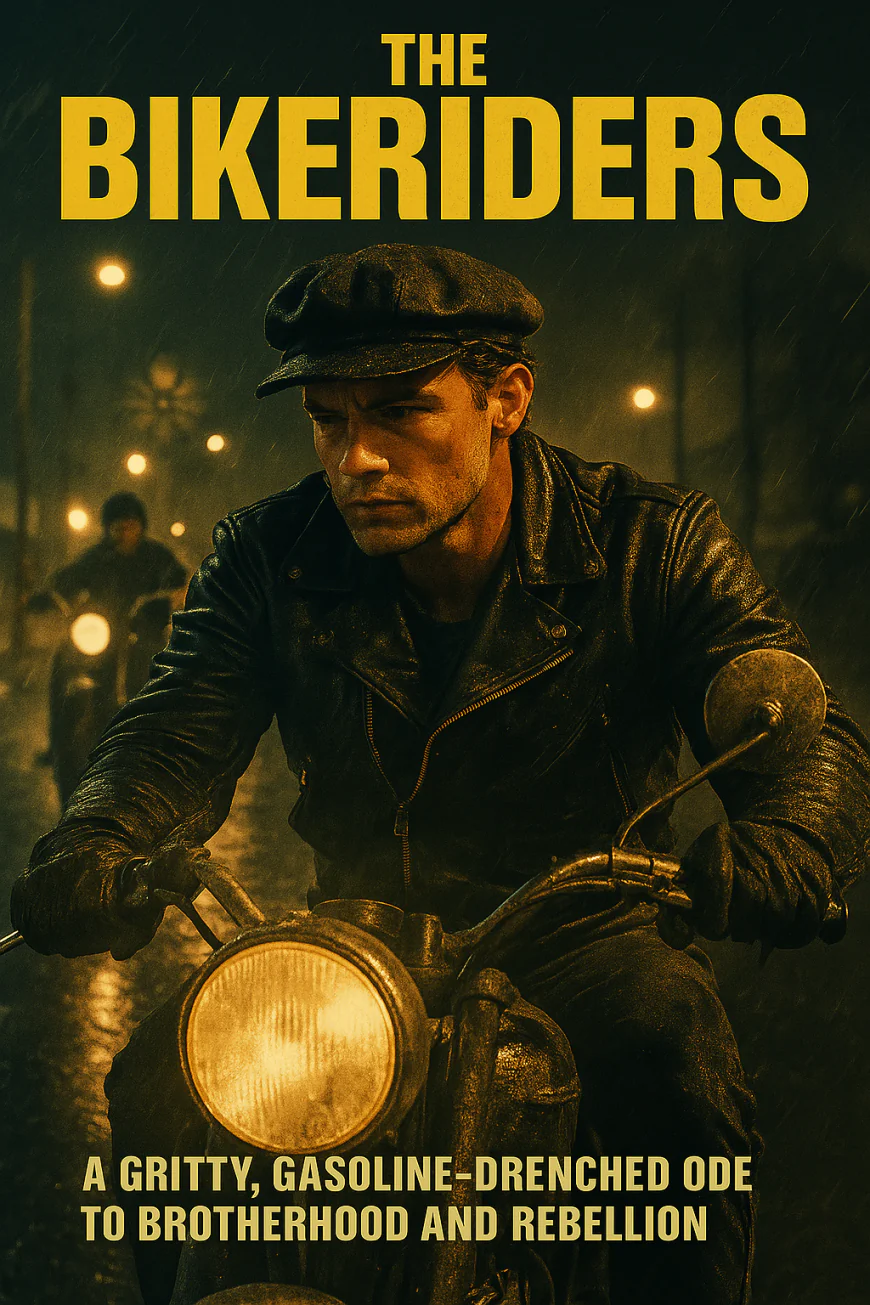The Bikeriders – A Gritty, Gasoline-Drenched Ode to Brotherhood and Rebellion
The Bikeriders revs up an era of rebellion with magnetic performances, haunting cinematography, and timeless themes of loyalty, freedom, and self-destruction. Jeff Nichols delivers a poetic yet gritty look at the rise and fall of a Midwestern motorcycle club in one of 2024’s most emotionally charged dramas.

The Bikeriders – A Gritty, Gasoline-Drenched Ode to Brotherhood and Rebellion
Some films thrum with the rhythm of the open road. The Bikeriders doesn’t just ride—it storms forward with leather-jacketed ferocity, soulful melancholy, and the fading thunder of a culture on the brink of collapse.
Directed by Jeff Nichols and inspired by the 1967 photojournalism book of the same name, the film fictionalizes the origins of a motorcycle club in 1960s America—its rise, its romance, and its quiet, inevitable unraveling. Through cigarettes, backfires, bar fights, and stolen kisses, The Bikeriders captures a moment in American history that feels both specific and universally haunting.
What the Film Is Really About
At the center is Kathy (Jodie Comer), whose voice narrates the journey like a mournful campfire tale. She recounts her years with Benny (Austin Butler), a mysterious, magnetic rider whose allegiance to the club teeters between love and addiction. Tom Hardy plays Johnny, the club’s founder—a mix of working-class idealism and brooding dominance, equal parts Marlon Brando and midwestern blue-collar dad.
Together, they form the emotional triangle of the film: loyalty, danger, and longing. As new, younger members begin to shift the club from brotherhood into something more anarchic and violent, Kathy begins to wonder if love is enough—and if Benny will ever choose her over the ride.
Why It Packs an Emotional Punch
-
A Story Built on Real Emotion
The film’s power lies not in explosive plot twists but in the quiet moments: a glance across a dive bar, the echo of an engine in the night, a woman’s grief as she loses someone still sitting next to her. -
An Evocative Time Capsule
Nichols reconstructs 1960s Midwest with authenticity—pool halls, greasy diners, dusty backroads. The atmosphere is thick with nostalgia and tension. -
Performances That Linger
Jodie Comer delivers one of the most emotionally raw performances of the year. Her accent, timing, and internal struggle ground the film in a female gaze that’s rarely afforded in this genre. Butler simmers with controlled intensity, while Hardy gives one of his most restrained and layered performances to date. -
Cinematography That Breathes Smoke and Steel
Every frame feels like a still photograph from a different America—grainy, golden, and ghostly. Cinematographer Adam Stone gives the film a look that’s both rough and poetic.
Why It’s Not Just Another Biker Movie
| Element | What Makes It Stand Out |
|---|---|
| Emotional Perspective | Told through Kathy’s eyes, the film reveals the vulnerability and cost of outlaw glamour. |
| Literary & Visual Influence | Based on real photographs and interviews, the movie feels honest—never romanticized. |
| Complex Morality | It’s not about heroes or villains. It’s about choices, consequences, and quiet betrayals. |
| Subdued Power | Violence isn’t glorified; it’s presented as tragic, sometimes senseless, always human. |
Audience Reactions & Cultural Response
Many who expected a testosterone-fueled action flick were surprised to find a quiet character study instead. But that’s what makes The Bikeriders special—it trades spectacle for substance. Viewers have praised its emotional weight, its atmospheric pacing, and its refusal to fit into genre boxes.
It’s a film that doesn’t shout to be heard. It idles in the background of your thoughts, only to roar back later when you least expect it.
Final Word
The Bikeriders is a beautifully broken elegy to an era of outlaws and lost men. It's about what freedom costs, what brotherhood hides, and what happens when your world moves faster than your heart can follow.
In the world of Review & Watch, this is a film worth sitting with. Not just to admire its craft, but to feel its quiet, bruising ache long after the credits roll. Whether you ride or not, The Bikeriders makes you understand why some never stop chasing the wind.
What's Your Reaction?
 Like
0
Like
0
 Dislike
0
Dislike
0
 Love
0
Love
0
 Funny
0
Funny
0
 Angry
0
Angry
0
 Sad
0
Sad
0
 Wow
0
Wow
0





























